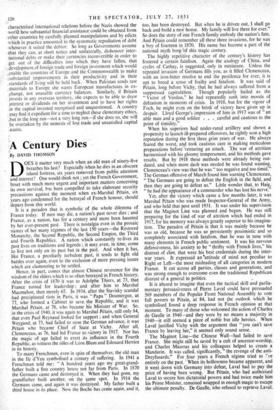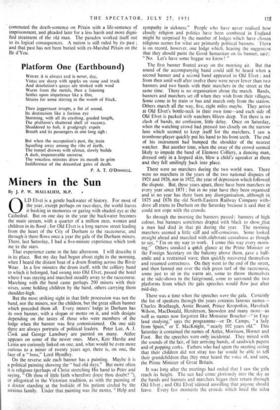A Century Dies
.1fly DAVID THOMSON DOES it matter very much when an old man of ninety-five breathes his last? Especially when he dies in an obscure Island fortress, six years removed from public attention and interest? One would think not ; yet the French Government, beset with much more urgent and important matters concerning its own survival, has been compelled to take elaborate security precautions against the moment when ex-Marshal Main, six years ago condemned for the betrayal of French honour, should depart from this world. • It is a paradox that is symbolic of the whole dilemma of France today. If men may die, a nation's past never dies ; and .France, as a nation, has for a century and more been haunted by her ever-present past. There is nostalgia even in the prosaic names of her many regimes of the last 150 years—the Restored Monarchy, the Second Republic, the Second Empire, the Third and Fourth Republics. A nation which constantly re-lives its past lives on traditions and legendS ; it may even, in time, come to live not only on its past but in the past: And when it has. like France, a peculiarly turbulent past, it tends to fight old .battles over again, even to the exclusion of more pressing issues which are clamouring to be settled. Hence, in part, comes that almost Chinese reverence for the .wisdom of the elders which is so often betrayed in French history. 'After the crisis of 1870 it was to Adolphe Thiers, at 73, that France turned for leadership ; and after him to Marshal Macmahon, then merely 65. In 1934, after the Stavisky scandal had precipitated riots in Paris, it was " Papa " Doumergue, at 77, who formed a Cabinet to save. the Republic, and it was Marshal Main, at 78, who became his Minister of War. So, in the crisis of 1940, it was again to Marshal Main, still only 84, that even Paul Reynaud looked for support ; and when General Weygand, at 73, had failed to stem the German advance, it was ,Petain who became Chief of Stateat Vichy. After all, Clemenceau, at 76, had led France to,victory in 1917. Nor has the magic of age failed to exert its influence in the Fourth Republic, as witness the roles of Leon Blum and Edouard Herriot in its history.
• To many Frenchmen, even in spite of themselves, the old man • in the Ile d'Yeu symbolised a century of suffering. In 1941 a Frenchman told me: "A hundred years ago my great-grand- father built a fine country house not far from Paris. In 1870 the Germans came and destroyed it. When they had gone, my grandfather built another, on the same spot. In 1914 the Germans came, and again it was 'destroyed. My father built a third house in its place. Now the Boche has come again, and it, too, has been destroyed. But when he is driven out, I shall go back and build a new house. My family will live there for ever." So does the story of one French family embody the nation's fate. And Petain could remember all these three invasions, for he was a boy of fourteen in 1870. His name has become a part of the national myth borp 'of this tragic century.
The highly repetitive character of the century's history has fostered a certain fatalism. Again the analogy of China, and cycles of Cathay, is suggested, only in miniature. Unless the repeated invasion of Germans fills you, as it filled Clemenceau, with an iron-bitter resolve to end the pestilence for ever, it is apt to breed a sense of frailty and fatalism. It was said of Main, long before Vichy, that he had always suffered from a suppressed capitulation. Though popularly hailed as the "Victor of Verdun," he had repeatedly sunk into moods of defeatism in moments of crisis. In 1918, but for the vigour of Foch, he might even on the brink of victory have given up in despair. Lloyd George's impression of him in 1917 was of an able man and a good soldier . . careful and cautious to the point of timidity."
When his superiors had under-rated artillery and shown a propensity to launch ill-prepared offensives, he rightly won a high reputation during the first three grim years of war. He always feared the worst, ang took cautious care in making meticulous preparations before -venturing an attack. The war of attrition harmonised with his gloomy temperament, and his methods gave results. But by 1918 these methods were already being out- dated, and when more dash was needed he was found wanting.
Clemenceau's view was that he was " too negative and too timid."
The German offensive of March found him warning Clernenceau, "The Germans are going to defeat the English in the field, and then they are ,going to defeat us." Little wonder that, to Haig, "he had the appearance of a commander who has lost his nerve." Yet, after the victory which came a few months later, it was Marshal Main who was made Inspector-General of the Army, and who held that post until 1931. It was under his supervision that the Maginot Line was planned and begun. He was still preparing for the kind of war of attrition which had ended in 1917, for his memory was always greatly superior to his imagina- tion. The paradox of Main is that it was mainly because he was so old, because he was so persistently pessimistic and so completely associated with fatalism, that he was in tune with many elements in French public sentiment. It was his nervous defensiveness, his anxiety to be "thrifty with French lives," his distrust of élan, that were his best credentials during the inter- war years. It expressed an 'attitude of mind not peculiar to Right or Left—the most misleading of all categories in modern France. It cut across all parties, classes and generations, and was strong enough to overcome even the traditional Republican distrust of a general in _politics.
It is abpurd to imagine that even the tactical skill and parlia- mentary persuasiveness of Pierre Laval could have persuaded 569 members of the Popular Front National Assembly to vote full powers to Petain, at 84, had not the outlook which he symbolised found a deep response in French opinion at that moment. To many of those who welcomed the action of Charles de Gaulle in 1940—and they were by no means a majority in 1940—it still seemed a piece of noble but idle heroics. When Laval justified Vichy with the argument that "you can't save France by leaving her," it seemed only sound sense. .
The Maginot Line—the Chinese Wall—lad failed to save France. She might still be saved by a cult of ancestor-worship, and Charles Maurras and his colleagues helped to create a Mandarin. It was called, significantly, "the revenge of the anti- Dreyfusards." For four years a French regime tried to rve entirely on the past. ' When its hollowness became apparent, and it went down with Germany into defeat, Laval had to pay the price, of having been wrong. But Petain, who had authorised Laval to secure him dictatorial powers and had twice made him his Prime Minister, remained wrapped in enough magic to escape the ultimate penalty. De Gaulle, who refused to reprieve Laval, commuted the death-sentence on Main with a life-sentence of imprisonment, and pleaded later for a less harsh and more digni- fied treatment of the old man. The paradox worked itself out to its logical consequences. A nation is still ruled by its past ; and that past has not been buried with ex-Marshal Main on the Ile d'Yeu.



































 Previous page
Previous page